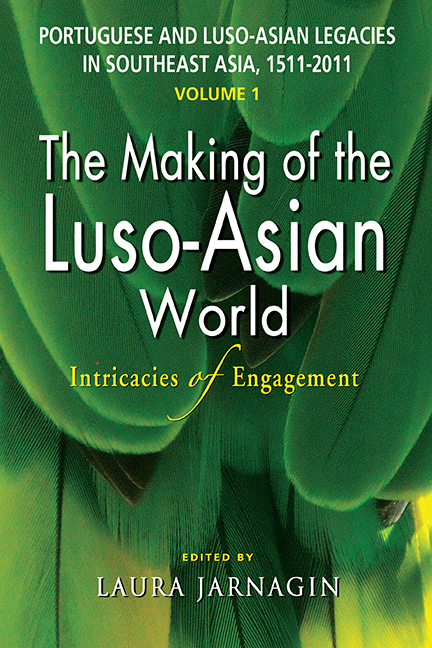 Portuguese and Luso-Asian Legacies in Southeast Asia, 1511–2011, vol. 1
Portuguese and Luso-Asian Legacies in Southeast Asia, 1511–2011, vol. 1 Book contents
- Frontmatter
- Contents
- List of Charts, Figures and Tables
- A Tribute to Glenn Ames
- Preface
- List of Contributors
- Glossary
- Introduction: Towards Clarity through Complexity
- Part One Adaptations and Transitions in the South and Southeast Asian Theatres, Sixteenth through Eighteenth Centuries
- Part Two Dispersion, Mobility and Demography from the Sixteenth into the Twenty-first Centuries
- Part Three Mixed Legacies: The Portuguese and Luso-Asians in the Twentieth and Twenty-first Centuries
- 9 Portuguese Communities in East and Southeast Asia during the Japanese Occupation
- 10 Indo-Portuguese Literature and the Goa of Its Writers
- 11 Binding Ties of Miscegenation and Identity: The Narratives of Henrique Senna Fernandes (Macao) and Rex Shelley (Singapore)
- 12 Portuguese Past, Still Imperfect: Revisiting Asia in Luso-Diasporic Writing
- Bibliography
- Index
11 - Binding Ties of Miscegenation and Identity: The Narratives of Henrique Senna Fernandes (Macao) and Rex Shelley (Singapore)
from Part Three - Mixed Legacies: The Portuguese and Luso-Asians in the Twentieth and Twenty-first Centuries
Published online by Cambridge University Press: 21 October 2015
- Frontmatter
- Contents
- List of Charts, Figures and Tables
- A Tribute to Glenn Ames
- Preface
- List of Contributors
- Glossary
- Introduction: Towards Clarity through Complexity
- Part One Adaptations and Transitions in the South and Southeast Asian Theatres, Sixteenth through Eighteenth Centuries
- Part Two Dispersion, Mobility and Demography from the Sixteenth into the Twenty-first Centuries
- Part Three Mixed Legacies: The Portuguese and Luso-Asians in the Twentieth and Twenty-first Centuries
- 9 Portuguese Communities in East and Southeast Asia during the Japanese Occupation
- 10 Indo-Portuguese Literature and the Goa of Its Writers
- 11 Binding Ties of Miscegenation and Identity: The Narratives of Henrique Senna Fernandes (Macao) and Rex Shelley (Singapore)
- 12 Portuguese Past, Still Imperfect: Revisiting Asia in Luso-Diasporic Writing
- Bibliography
- Index
Summary
Vários “pequenos” portugueses fizeram sentir a sua presença na “imensa Asia”, uns quase como reis, alguns como escravos, o maior número simplesmente como portugueses capazes de amar mulheres orientais e ser por elas amados. Capazes de fecundar mulheres de cor e fazer sair dos seus ventres portugueses também de cor.
(Several “small” Portuguese made felt their presence in the “enormous Asia”, some as almost kings, others as slaves, the great majority just as Portuguese [who were] able to love oriental women and be loved by them. [They were] able to inseminate women of colour and to make their wombs produce other Portuguese also of colour.)
Gilberto Freyre, Aventura e RotinaDespite the dynamics of globalization and rapid economic and political development, it is still noticeable nowadays that several Portuguese creolized communities in postcolonial societies have resisted cultural homogenization, particularly those scattered throughout the detached, peripheral regions of East and Southeast Asia that were under the Estado da Índia's sovereignty and influence (Goa, Daman, Diu, Sri Lanka, Malacca, Macao and Timor) and that the Portuguese created alongside the local political authorities (Indonesia and today's Singapore).
By the beginning of the seventeenth century, the official population in the colonies of several territories in Asia that proudly claimed Portuguese ancestry had reached nearly one-and-a-half million individuals, as a legacy of colonial (dis)encounters. Centuries later, the Portuguese descendants of this “shadow empire” forged through trading, matrimonial alliances and cultural networks — notwithstanding a pragmatic adaptation to times of unprecedented political, economic and cultural upheaval — persist in a quest for identity and cultural reaffirmation of “Portuguese” cultural differentiation, which continues to be faithfully perpetuated and transmitted, centuries after the earlier Portuguese contacts ceased. These communities show distinctive aspects of what could be called a certain “Luso-Eurasianness”, exhibited in oral literature, religious practices, family surnames, ceremonies, cuisine, public structures, ways of speaking and, above all, in identity-making religious and cultural reinterpretation of lived and shared commonalities.
This study argues that, even if relatively scant attention has been paid to the literary production of the communities considered here, in particular in Anglophone postcolonial studies, they have influenced and continue to exercise seminal influence on most postcolonial imaginaries, either in their respective societies or in the contemporary fiction of the Luso diaspora.
- Type
- Chapter
- Information
- Portuguese and Luso-Asian Legacies in Southeast Asia, 1511–2011, vol. 1The Making of the Luso-Asian World: Intricacies of Engagement, pp. 239 - 258Publisher: ISEAS–Yusof Ishak InstitutePrint publication year: 2011
